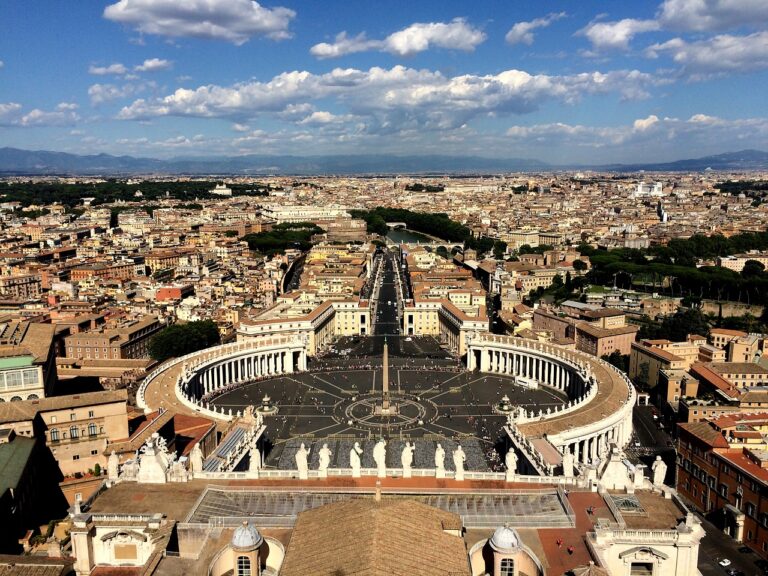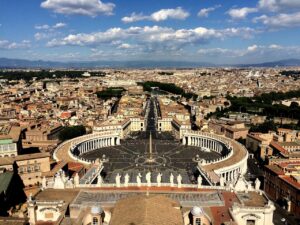(China) – Last week, the Holy See and the Chinese government renewed the controversial provisional agreement on the appointment of bishops between the Vatican and China. Stephen Schneck, a member of the U.S. Commission on International Religious Freedom (USCIRF), said that the commission was “tremendously disappointed” with the decision and had expressed that view to the upper echelons of the U.S. government.
On October 23, the Vatican and the Chinese government renewed their provisional agreement on the appointment of bishops. Both sides signed the agreement on September 22, 2018, for two years and renewed it on October 22, 2020. The latest extension coincides with the 20th Congress of the Chinese Communist Party (CCP) and the start of the third term of one-party ruling leader Xi Jinping. In recent years, the Communist Party of China has tightened government control over religious institutions.
The Vatican News’ Press Release released a statement regarding the “Accord”:
The Vatican Party is committed to continuing a respectful and constructive dialogue with the Chinese Party for a productive implementation of the Accord and further development of bilateral relations, with a view to fostering the mission of the Catholic Church and the good of the Chinese people.
In an interview with L’Osservatore Romano and Vatican Radio – Vatican News, the Holy See’s Secretary of State, Cardinal Pietro Parolin, said the two-year renewal “mainly concerns aspects that are essential to the daily life of the Church in China.”
He continued:
Pope Francis—with determination and patient foresight—has decided to continue along this path not under the illusion of finding perfection in human rules, but in the concrete hope of being able to assure Chinese Catholic communities, even in such a complex context, of the guidance of pastors who are worthy and suitable for the task entrusted to them[…] the ultimate goal of this journey is for the ‘little flock’ of Chinese Catholics to advance in the possibility of living serenely and freely their Christian life, which is made up of the proclamation of the Gospel, solid formation, joyful celebration of the Eucharist, as well as an industrious witness of charity, in order to be close to those who struggle the most to cope with life, as was the case during the difficult time of the pandemic.
In response to the renewal of the Vatican-Beijing agreement on the appointment of bishops, Stephen Schneck, commissioner of the U.S. Commission on International Religious Freedom, said on Crux news:
I certainly understand as a Catholic that the Vatican is playing the long game here and not thinking about the immediate circumstances, but I think that these agreements have not produced any improvement in religious freedom for Catholics in China, and I think that the Holy See should really rethink its decision to dance with Xi on this whole business.
Schneck expressed that he was very concerned about this tentative agreement renewal, “It’s just really hard to imagine that whatever they might be hoping for in the long game; the immediate situation on the ground in China for Catholics is something that I think the Holy See should be concerned about.”
Part of the problem, he added, is the Vatican’s lack of transparency about the content of the agreement. And he’s concerned about the Chinese government’s “Sinicization” of religion in China, essentially making religions exist in accordance with Chinese culture and society. “In fact, I would go as far as to say this is my personal comment, but it looks to me that China may, in fact, be using this agreement to crackdown further on underground Catholics in China and if that’s the situation, then the Vatican’s actually losing ground with China, and not gaining ground at all.”
President Joe Biden appointed Schneck, a Catholic, to the nine-member commission in June. USCIRF is an independent, bipartisan federal commission that oversees and reports to the U.S. government and Congress on religious freedom.
Catholics in China have long been divided between the official, state-sanctioned Church and the “underground” Church, which is loyal to Rome. The Holy See fears that the official patriotic Church under the control of the Chinese regime will remain independent for a long time, leading to a separation from the structure of the Holy See, as in the case of Protestantism. Although the Holy See classifies these bishops as “illegitimate,” it has had to recognize their validity in carrying out their sacred priesthood.
Prior to the signing of the Vatican provisional agreement, the bishops of the Chinese Catholic Patriotic Church, who had been ordained independently of the Holy See, had been excommunicated by the Holy See, but these illegitimate bishops were eventually pardoned and recognized by the Holy See, especially as a condition for the signing of the provisional agreement on episcopal ordination, which recognized the illegitimate bishops who had previously been excommunicated, including individual illegitimate bishops of ill reputation who had also been exempted by the Holy See.
On the surface, the Holy See’s efforts led to the communion and unity of the Chinese patriotic and underground churches. But the provisional agreement on the appointment of Chinese bishops also led to the dilution of the underground Church by the Holy See; which had long refused to join the regime-controlled Chinese Catholic Patriotic Association; they had been loyal to the Holy See and for which they had paid a heavy price. But with the signing of the agreement between the two sides, the officials have pressured the underground bishops and churches to join the Patriotic Association in its entirety and claimed that the Holy See has fully embraced the bishops and patriotic churches supported by the Patriotic Association, so what are the reasons for the opposition of the underground bishops and churches to join the Patriotic Association?
The Holy See’s initial intention was to preserve the ecclesial hierarchy of the Catholic Church through a mutual agreement in exchange for the Patriotic Church’s official recognition of and respect for the authority of the Holy See, especially with regard to the power to appoint bishops. But the potential crisis of this attempt is that all bishop candidates put forward by the Patriotic Church are officially politically vetted. The Holy See has few, if any, opportunities to choose bishops. And these initiatives of the Holy See seriously contradict the conscience of the underground bishops and the faith of the Church. These underground bishops were persecuted by the regime for refusing to join the Patriotic Association and were arrested and disappeared for years. In some dioceses, the underground bishops also had to be demoted to give way to official Patriotic Association bishops.
The Vatican’s attempts to protect underground bishops and churches from being able to practice their faith more freely since the signing of the Vatican – China’s provisional agreement have not resulted in improved religious freedom for the underground Catholic Church over the past few years. Missing clergy have not been released, and those bishops and faithful who are loyal to the Vatican often face the threat of being required to join officially registered churches to facilitate control and brainwashing by Chinese authorities. Dioceses such as the large congregation in Hebei, long known for its steadfastness, are now facing a catastrophic blow, as the CCP force priests forced to join the Patriotic Association.
Only six new bishops have been appointed since the agreement was reached, which critics say proves that it has not had the desired effect and that the Chinese authorities’ oppression and restrictions on religious freedom are ongoing. Typically, China’s official bishops and churches are rarely able to truly practice their freedom of faith, including the ordination of new bishops by papal appointment or consent, which must take place under the strict supervision of public security police and officials from the Religious Affairs Bureau (United Front Work Department). Before being ordained, they must also undergo a political evaluation by the authorities and attend political study sessions organized by the authorities for the purpose of indoctrinating the highest instructions and the latest policies of the Party Central Committee. In the future, will the appointment of underground bishops in China be subject to an agreement that they must also undergo political brainwashing by the Party before being consecrated?
~Gao Zhensai, Special Correspondent of ChinaAid

